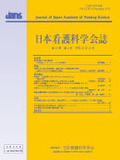Japanese
English
- 販売していません
- Abstract 文献概要
- 参考文献 Reference
要旨
目的:学童期精神科閉鎖病棟に入院し,他者とうまく距離をとることができない発達障害の学童に対して,看護師がどのようにかかわっているのかを明らかにする.
方法:Leiningerの民族看護学の研究方法を用い,主に参加観察とインタビューを行った.主要情報提供者は看護師9名,一般情報提供者は学童6名とその家族6名,医療スタッフ5名であった.
結果:テーマ6つと大テーマ1つが抽出された.看護師は,子どもをありのまま受け止めて,子どもが距離の近さで訴える‘人とかかわりたい’思いを見極めていた.看護師が子どもに適切なかかわり方を教えたり看護師との間で子どもと大人との信頼関係を修復したりすることで子どもの思いに応えると,子どもは他の子どもとの遊びや思いの言語化ができるように変化していた.
結論:看護師は,子どもの対処方法の体得を支え,子どもの大人への信頼感やアタッチメントを修復することで,子どもの‘人とかかわりたい’思いに応える必要があると示唆された.
The purpose of this study was to describe the nursing care for school aged children with developmental disabilities experiencing difficulty in social interaction hospitalized in a pediatric psychiatric closed unit. The study incorporated Leininger's theory of the ethnonursing research method and used a qualitative design of observation-participation and interview data. Nine key informants included nursing staff at the pediatric psychiatric hospital. Seventeen general informants included six school aged children with pervasive developmental disorders (PDD) or attention deficit hyperactivity disorder (ADHD), six fathers and mothers, and five medical staff. Six main themes and one core theme emerged from the analysis of the data. The core theme was that nurses accepted children as they are and responded to their desire to relate with others, which is represented in closeness. The meaning of nursing care for them was that nurses supported them to be able to learn how to relate with others and restored their trust in adults and attachment. They became able to play with other children and express their thoughts to others through the nursing care. The findings suggest that it is necessary for nurses to understand the reasons and meaning of their closeness to identify their desire, and to respond to the desire to relate to others, which is manifested in closeness.
Copyright © 2014, Japan Academy of Nursing Science. All rights reserved.


